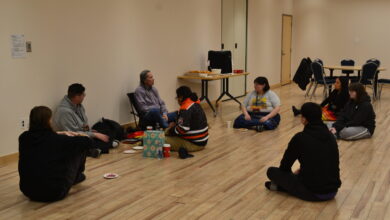Restoring joy in health care: Research to reduce burnout in the workplace
"We really have to work towards those objectives in Canada in order to make our healthcare system better," Dr. Forgie says.
 Provided by Healing Works Foundation
Provided by Healing Works FoundationDr. Sarah Forgie, former chair of pediatrics at the University of Alberta, began to consider burnout in the health-care system during the COVID-19 pandemic, when workers were overwhelmed and losing connection with patients.
“I notice[d] that my colleagues were really very sad, and pediatrics is normally a happy place,” Dr. Forgie said.
Alongside Nicole Firth, academic department manager in the U of A department of pediatrics, Dr. Forgie began extensive research on the topic. Together, they realized that being able to communicate and connect with colleagues “sparks [an] inspiration.”
To them, that was the feeling of joy, “and [they] wanted to make sure that other people were also feeling that,” Dr. Forgie said.
“[This] was the genesis of [the research], where we worked with colleagues to try to remind people about being intentional … [and] bring back the joy [to the workplace].”
Dr. Forgie and Firth needed to gain more evidence of the benefits of joy in health care and decided to bring Dr. Marghalara Rashid, assistant professor in the U of A faculty of medicine and dentistry, to the project.
“We had to bring some seriousness … so the next stage was [to] involve Dr. Rashid, who has shown a stepwise approach of what can we do next,” Dr. Forgie said.
Focusing about joy in health care is “the most serious thing we can do,” Forgie says
After collecting evidence behind the observations, the postive emotion, engagment, relatiohnsips, meaning, and accomplishment (PERMA) model approach appeared as a form of promoting joy in health care.
The “Institute for Health and Improvement Framework … has nine important aspects … which are more consistent than the PERMA model. [Advocating for] autonomy, rewards, and value that you want to encourage your colleagues [with],” Rashid said.
With such methods and the proper “training [of] your leader[s] to actually role model joy … that’s how you get the downstream effect,” Dr. Forgie said.
“Some people feel that the situation is so bad in health care or in universities that how could we even be talking about joy … [but] it is the most serious thing we can do,” Dr. Forgie added.
According to Dr. Forgie, these approaches serve to improve relationships and strengthen the health-care system.
“There is actually value in work like this and nothing is non-serious,” Dr. Rashid said.
“We often do this for each other if we [are] having a rough go with something … [we remind] each other to choose the joy, to look for the joy, and to remember this work,” Dr. Firth said.
For Dr. Forgie, this focus on joy in health care is “really more [about] the ‘us’ and how can we as individuals start thinking about the bigger picture.”




